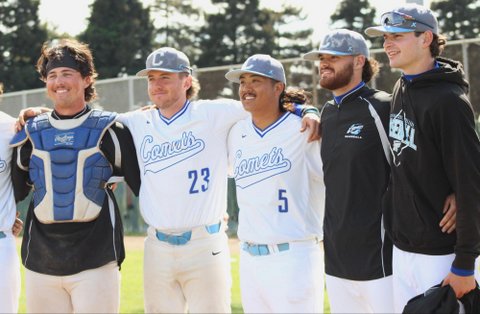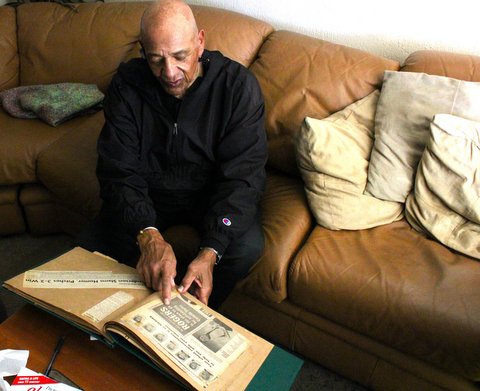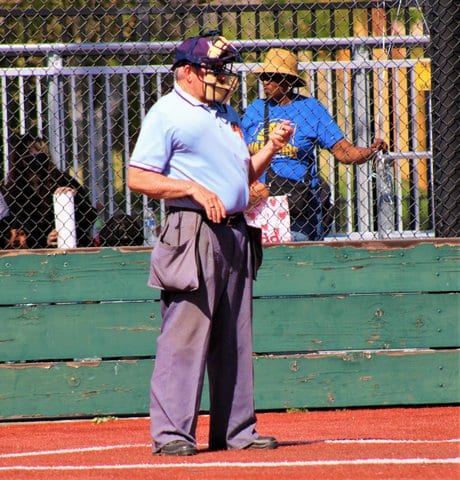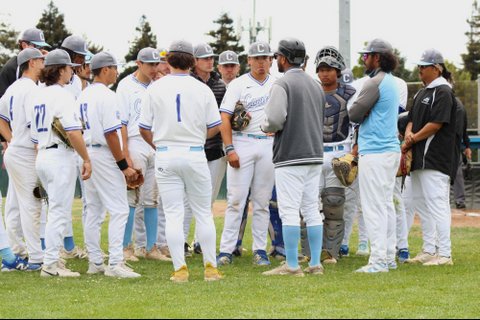
14 May From Australia to the Bay: Nixon Collins-Brown’s Unlikely Journey Through Baseball

Contra Costa College Australian sophomore Nixon Collins-Brown, second from left, and his teammates suited up together for the final time April 25. (Joe Porrello / CC Pulse file)
By Joe Porrello
Long before joining the baseball team at Contra Costa College, Nixon Collins-Brown grew up playing rugby and cricket about 7,500 miles away in Newcastle, Australia.
The 23-year-old Comets sophomore did not start playing baseball until his teenage years. Today, he can play nearly any position, though he primarily holds down first base. What started as a way to have fun with his brothers turned into his main passion and focus, providing lifelong connections and a pathway for his future.
“I ended up liking it way more than other sports I played,” he said. “Baseball just felt right; I fell in love with it.”
A Glove and a Dream
Unlike his many family members who play or watch cricket, he said he did not have the patience as a kid for matches that sometimes can last days at a time. Ironically, the very thing many people criticize about baseball — its slow pace — was what drew him in.
He devotes much of his time to the sport. His favorite hobby outside of playing baseball, after all? Training for it.
“That’s honestly what I enjoy doing most when I’m not playing,” said Collins-Brown.
Although baseball has a long history in Australia, stretching back to the 1850s, the sport still lacks popularity and professional opportunities there. So Collins-Brown made the choice to take a chance at making a team in America — over 15 hours away by plane — to gain exposure.
“I’ve always wanted to come over to America, and baseball was a good gateway to get here with a purpose,” he said.
But making the move was anything but simple — it took Collins-Brown eight months just to obtain his U.S. student visa.
“We’re considered one of the easy countries to get a visa to (America) from, but everything that’s happened recently has made it much harder to get into the U.S.,” he said.
And that was not the end of the strain.
Far From Home
“It was definitely an extremely hard decision leaving home and coming over here by myself on a plane not knowing who I was getting picked up by,” Collins-Brown said.
Still, he recommends the experience to anyone willing to step out of their comfort zone.
“It was just something I wanted to do… start a new life where I knew nobody — it just gives you a fresh perspective,” he said.
In over two years, Collins-Brown has only met one other Australian in the Bay Area — when they spotted each other wearing matching hoodies at a San Francisco Giants game.
“That was pretty awesome,” he said.
Thrown in the deep end, as he puts it, Collins-Brown had to figure out how to get his driver’s license, a car and a place to live — all while adapting to a new way of life.
“The cultural change was pretty big for me, particularly in the Bay Area,” he said. “It was a whirlwind trying to get accustomed to everything — especially the people. It took me a while to fit in.”
Locals told Collins-Brown that the Bay Area differs from the rest of the U.S. in many ways, which he found true after visiting Kansas this past summer, where met three fellow Australian baseball players.
One difference that sticks out to him? The language.
“It took me some time to figure out what people were saying, and it went both ways,” he said. “We both speak English, but they are very different types of English.”
When Collins-Brown meets someone new, they almost always ask or guess where he’s from as soon as they hear his accent, but he says the interest makes him feel welcome.
“It’s always a good way to break the ice with anyone,” he said. “And people here always seem really interested in what I have to say, which is a nice feeling.”
One thing he finds amusing is when people check his Australian ID.
“Ninety percent of people haven’t seen one, so they inspect it for like five minutes and show it to all their co-workers,” he said.
Another distinction is the food — what Collins-Brown misses most about home outside of friends and family.
“The food out there is just more fresh and organic, in my opinion, but obviously my body reacts better to what I grew up eating,” he said. “The first thing I get when I’m home is a sausage roll. It’s the best; you can find them out here, but they’re not the same.”
Family Ties
Collins-Brown has gone back to Australia twice since moving in 2022, and leaving doesn’t get easier.
“It’s just difficult saying bye to everyone, you know?” said Collins-Brown. “I miss them every day.”
The hardest part about being away from home, he says, is missing big life events of friends and relatives.
“My brother is having a baby and is going to be getting married, but I might not be able to be there for either,” said Collins-Brown.
However, after more than two years, he has developed new, strong connections with those related by sweat instead of blood — his teammates.
“All the guys on the team are definitely my family over here,” he said. “Every year for Thanksgiving, I go to my teammate’s family’s house for Thanksgiving, and they invite me to Christmas.”
The bond between him and his roommates — from France, Japan, the Netherlands and, of course, California — living in an apartment off campus, went even further.
“Living with each other side by side for two years, we turned into best friends for life,” said Collins-Brown.
This year’s team, in particular, he says, had the strongest bond.
“You naturally get closer when you’re with each other for five or six days a week and are dealing with the same stuff, but this year’s team was especially tight,” he said.
Hurdles and Hobbies
The connection with his teammates has been crucial when Collins-Brown deals with the logistics of being an immigrant and the realities of being a sophomore student-athlete in junior college.
In the country on a student visa, he is not allowed to work or earn any money and relies on his scholarship funds.
“I was told that if [the authorities] pick up any wind I’m making some kind of money, I’ll get removed from the country,” said Collins-Brown.
Income or no income, international students are “on thin ice” regardless, according to Collins-Brown.
“People are being deported just for sharing their political opinions online,” he said.
Balancing a full-time academic schedule with athletics was also tough at first.
“Schooling here is a lot more difficult than where I’m from,” he said. “It was hard getting on my feet.”
With his baseball schedule, Collins-Brown has tight windows for studying and homework. In the fall — training season — he has class, then lifts weights with the team for one hour directly before a 3-4 hour, on-field practice, followed by more classes or voluntary weightlifting and batting cage swings — five or six days a week. During the season in spring, some of that practice and weightlifting is replaced with games. In both cases, it leaves pretty much only Sunday for Collins-Brown to sit down at his laptop all day and get homework and studying done for the entire week.
When he does get a chance to tear himself away from the game he loves and his schoolwork, Collins-Brown likes taking in a view of the bay at Grizzly Peak in Berkeley or listening to Australian indie rock group Sticky Fingers, his lifelong favorite band.
“I actually saw them perform out here in San Francisco last year, which was a cool moment; it was pretty surprising to see how popular they were in California,” he said.
Battling Time With Brotherhood
As junior college athletes have only two years of eligibility, Collins-Brown felt the weight of his responsibility to perform well on-field and exceed academically to earn his way onto a roster at a four-year university.
“The whole struggle of being a sophomore in junior college, that’s a big pressure,” he said. “Second-year guys like me have to figure out where we’re going to play next season.”
But when the going gets tough, he turns to his coaches and teammates for support.
“There were times that pressure was getting to me a lot, but I’d go and talk to my pitching coach or my assistant coach all the time and tell them how I was feeling, which always helped me level my head out,” he said.
That fact he was not alone also provided comfort.
“We had five sophomores this year going through the same thing, so we could always relate and talk together about it,” said Collins-Brown.
A New Chapter
Now, he’ll have to try developing that rapport again as he leaves his found family and puts down new roots for a second time. Following this semester, Collins-Brown will attend Simpson University, 200 miles north of CCC in Redding, Calif., on a baseball scholarship.
While the most nerve-racking part of the change is stronger competition for a starting job and amongst opponents, the most exciting, he says, will be living in a dorm and alone for the first time.
“One of the main reasons I came here was to get the full college experience,” said Collins-Brown.
Visiting the new campus and practicing with the baseball team convinced him that he made the right choice.
“I really wanted to stay in California, and they look like they have a lot to offer,” he said. “The coaches and facilities were really nice and everyone on the team was welcoming.”
Though he’s excited about the new chapter, Collins-Brown will always carry a piece of the Bay Area with him.
“I love the Bay Area and all the people here — I think what I’ll miss most is the people I’ve met here and the friends I’ve made,” he said.
At Simpson, he plans to major in business with a focus on sports management.
He hopes to use his degree toward getting a work visa and starting a career in California. His five-year student visa will be expiring upon his university graduation. (Those in the U.S. on a student visa have a limited amount of time after finishing school in which to leave the country or make other arrangements to remain.)
Although he is knee-deep in his love of baseball, he says he still cannot help but feel a sense of missing out or falling behind.
As his friends back home make full-time wages and are getting married and having kids, he finds perspective in the advice of his coaches — who tell Collins-Brown not to look at playing baseball as a career but as a passion fulfilled.






No Comments